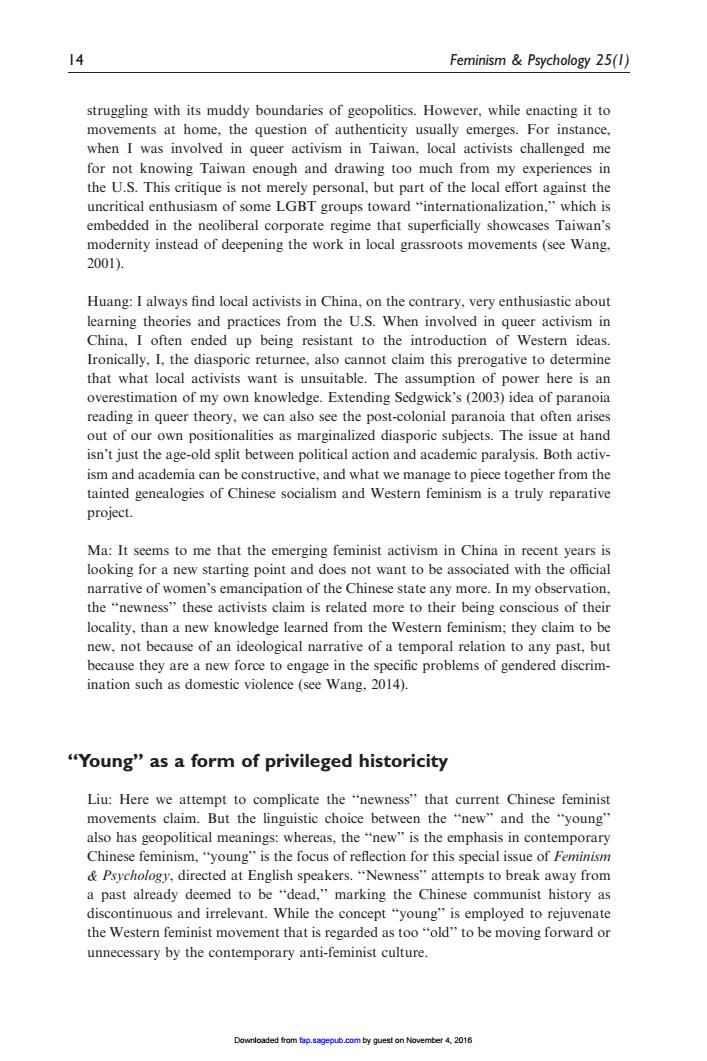正在加载图片...

14 Feminism Psychology 25(1) struggling with its muddy boundaries of geopolitics.However,while enacting it to movements at home,the question of authenticity usually emerges.For instance. when I was involved in queer activism in Taiwan,local activists challenged me for not knowing Taiwan enough and drawing too much from my experiences in the U.S.This critique is not merely personal,but part of the local effort against the uncritical enthusiasm of some LGBT groups toward "internationalization,"which is embedded in the neoliberal corporate regime that superficially showcases Taiwan's modernity instead of deepening the work in local grassroots movements(see Wang. 2001). Huang:I always find local activists in China,on the contrary,very enthusiastic about learning theories and practices from the U.S.When involved in queer activism in China,I often ended up being resistant to the introduction of Western ideas. Ironically,I,the diasporic returnee,also cannot claim this prerogative to determine that what local activists want is unsuitable.The assumption of power here is an overestimation of my own knowledge.Extending Sedgwick's(2003)idea of paranoia reading in queer theory,we can also see the post-colonial paranoia that often arises out of our own positionalities as marginalized diasporic subjects.The issue at hand isn't just the age-old split between political action and academic paralysis.Both activ- ism and academia can be constructive,and what we manage to piece together from the tainted genealogies of Chinese socialism and Western feminism is a truly reparative project. Ma:It seems to me that the emerging feminist activism in China in recent years is looking for a new starting point and does not want to be associated with the official narrative of women's emancipation of the Chinese state any more.In my observation, the "newness"these activists claim is related more to their being conscious of their locality,than a new knowledge learned from the Western feminism;they claim to be new,not because of an ideological narrative of a temporal relation to any past,but because they are a new force to engage in the specific problems of gendered discrim- ination such as domestic violence (see Wang,2014). "Young"as a form of privileged historicity Liu:Here we attempt to complicate the "newness"that current Chinese feminist movements claim.But the linguistic choice between the "new"and the "young" also has geopolitical meanings:whereas,the "new"is the emphasis in contemporary Chinese feminism,"young"is the focus of reflection for this special issue of Feminism Psychology,directed at English speakers."Newness"'attempts to break away from a past already deemed to be "dead,"marking the Chinese communist history as discontinuous and irrelevant.While the concept "young"is employed to rejuvenate the Western feminist movement that is regarded as too "old"to be moving forward or unnecessary by the contemporary anti-feminist culture. Downloaded from fap.sagepub.com by guest on November 4.2016struggling with its muddy boundaries of geopolitics. However, while enacting it to movements at home, the question of authenticity usually emerges. For instance, when I was involved in queer activism in Taiwan, local activists challenged me for not knowing Taiwan enough and drawing too much from my experiences in the U.S. This critique is not merely personal, but part of the local effort against the uncritical enthusiasm of some LGBT groups toward ‘‘internationalization,’’ which is embedded in the neoliberal corporate regime that superficially showcases Taiwan’s modernity instead of deepening the work in local grassroots movements (see Wang, 2001). Huang: I always find local activists in China, on the contrary, very enthusiastic about learning theories and practices from the U.S. When involved in queer activism in China, I often ended up being resistant to the introduction of Western ideas. Ironically, I, the diasporic returnee, also cannot claim this prerogative to determine that what local activists want is unsuitable. The assumption of power here is an overestimation of my own knowledge. Extending Sedgwick’s (2003) idea of paranoia reading in queer theory, we can also see the post-colonial paranoia that often arises out of our own positionalities as marginalized diasporic subjects. The issue at hand isn’t just the age-old split between political action and academic paralysis. Both activism and academia can be constructive, and what we manage to piece together from the tainted genealogies of Chinese socialism and Western feminism is a truly reparative project. Ma: It seems to me that the emerging feminist activism in China in recent years is looking for a new starting point and does not want to be associated with the official narrative of women’s emancipation of the Chinese state any more. In my observation, the ‘‘newness’’ these activists claim is related more to their being conscious of their locality, than a new knowledge learned from the Western feminism; they claim to be new, not because of an ideological narrative of a temporal relation to any past, but because they are a new force to engage in the specific problems of gendered discrimination such as domestic violence (see Wang, 2014). ‘‘Young’’ as a form of privileged historicity Liu: Here we attempt to complicate the ‘‘newness’’ that current Chinese feminist movements claim. But the linguistic choice between the ‘‘new’’ and the ‘‘young’’ also has geopolitical meanings: whereas, the ‘‘new’’ is the emphasis in contemporary Chinese feminism, ‘‘young’’ is the focus of reflection for this special issue of Feminism & Psychology, directed at English speakers. ‘‘Newness’’ attempts to break away from a past already deemed to be ‘‘dead,’’ marking the Chinese communist history as discontinuous and irrelevant. While the concept ‘‘young’’ is employed to rejuvenate the Western feminist movement that is regarded as too ‘‘old’’ to be moving forward or unnecessary by the contemporary anti-feminist culture. 14 Feminism & Psychology 25(1) Downloaded from fap.sagepub.com by guest on November 4, 2016